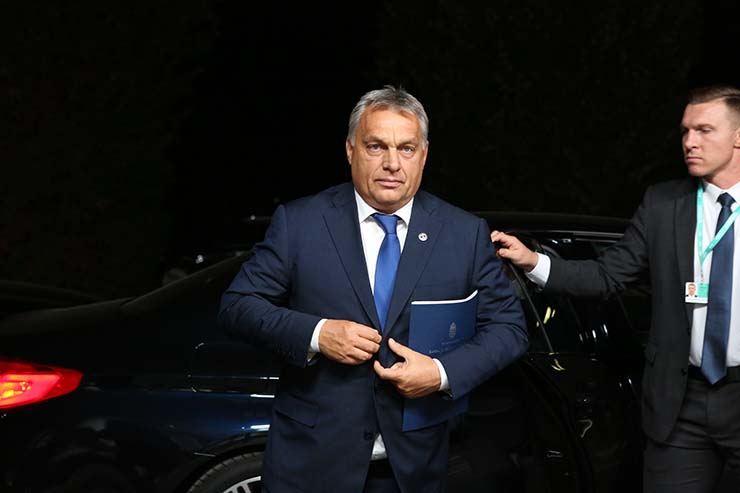On Oct. 31, Hungary’s Prime Minister Viktor Orbán and former German Chancellor Gerhard Schröder met in Vienna’s magnificent Sofiensäle ballroom to discuss geopolitics and the future of the Old Continent. It was a rendezvous gathered under magnificent chandeliers—the gold leaf stucco and the flags of Germany, Austria, and Hungary.
This major event presented an opportunity for the Austrian public to acquaint itself with views which are very much at odds with the line dictated from Brussels and Washington—a view obediently followed by the mainstream media machine. It was moderated by Roger Köppel, publisher and editor-in-chief of the Weltwoche, the leading Swiss political magazine.
Some 500 guests and 50 media representatives followed the dynamic discussion on the topic of “Peace in Europe.” For Roger Köppel, it was a particular pleasure to welcome two European statesmen as a neutral Swiss in neutral Austria. One is an outstanding German social democrat with an impressive career, who had the courage as a brilliant reform politician, to put the interests of his country above his career, his office, and his party. The other is the current president of the EU Council, a Hungarian freedom fighter against one-time Soviet oppression, is committed to diplomacy and peace in Europe.
The two senior statesmen, Orbán and Schröder, have known and respected one another for many years. Orbán praised Schröder as the statesman who defended Europe’s strategic autonomy and effectively saved the German economy. Gerhard Schröder, in turn, expressed support for Orbán’s bold peace initiatives and would like the rest of Europe to join him in the quest for a specifically European solution to the problem in Ukraine.
Schröder expressed the view that the war in Ukraine should be ended through diplomacy. The peace negotiations in Istanbul in the spring of 2022 failed because British Prime Minister Boris Johnson sabotaged them, Orbán said. History will show exactly why that happened. When asked why he had caused a stir in the EU with his shuttle mission between Kiev, Moscow, Beijing and Mar-a-Lago, Orbán said that he had tried to use his EU Council presidency for a peace initiative instead of holding various talks where he would be patted on the back by the Brussels bureaucrats. Schröder commented: “Who, if not the EU, should act?” Orbán should not be left alone in his endeavors. After all, it is owing to him that peace is being discussed again in Europe.
Both Schröder and Orbán are convinced that Russia cannot be defeated militarily. Time is working against Zelensky, and Russia will win this war. Before actual peace negotiations are possible, a ceasefire must be concluded. But the EU is ignoring reality and still believes that Ukraine can and will win. It is “a sad story that Europe does not want to be on the side of peace,” and that is why Schröder has “no hope for Europe”: “Anyone who wants peace is insulted as being anti-democratic and pushed aside.” He has taken the current German chancellor and the French president to task on this issue.
Both leaders reject the accusation of appeasement against an imperialist aggressor. According to Orbán, it is important to face reality: “This war is lost for Ukraine, which is increasingly in ruins!” That is what counts, not the dream of a military victory. Both emphasized that Europe must better represent and defend its interests. Schröder stated that Germany should work closely with France in the necessary peace efforts.
Regarding the U.S. presidential election, both politicians said they hoped that Donald Trump would be elected because he would immediately negotiate with Putin—something Trump confirmed in a telephone conversation with Orbán on the very day of the conference. But the Europeans would then sit in a corner, marginalized, while the big boys negotiate at the table.
Viktor Orbán sees the future as bleak. In Europe, natural gas is four times as expensive, and electricity is twice as expensive as in the United States. These facts will have fatal consequences for the economy if not reversed. Gerhard Schröder still sees strengths in the German economy and hopes that recovery is possible. He remains convinced that politicians and people want real solutions, and that reason will eventually prevail.
In response to the conference, the German establishment media dutifully went into a fit of righteous rage. “The Bizarre Summit of Putin’s Friends” was the headline in Germany’s top circulation Spiegel magazine. “None of this had anything to do with Halloween,” quipped the Zeit viciously, “at least not on the surface. It was the last evening in October, when—as in many other cities—all kinds of illustrious scary figures go from door to door, from house to house …”
“What happened this afternoon is remarkable,” commented the Stern magazine on Nov. 1. “The former German chancellor risked his life’s work by stubbornly insisting on his friendship with Russia’s dictator Vladimir Putin. He’s become a stranger to his country and especially to the Social Democrats.” The magazine bewailed the fact that, among the Viennese attending the event, “no debate existed over whether Schröder and his views are still permissible.”
The obvious implication—that there was something abnormal about accepting “Schröder and his views” as “permissible,” i.e. legitimate—reflects the deep pathology and totalitarian mentality of today’s Germany.
Hungary is fortunate to have the leader of Orbán’s caliber at its helm. Germany, by contrast, has but a slim hope of seeing a person of Schröder’s vision and stature occupy the office of the Bundeskanzler any time soon.

Leave a Reply